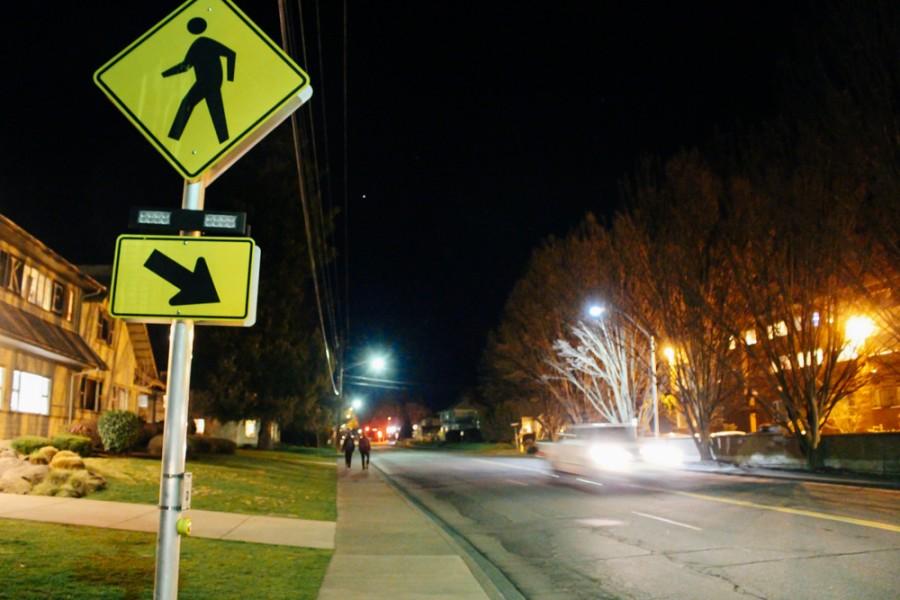Assaults Lead to Increased Interest in Methods for Self-defense
March 10, 2016
A series of violent assaults against residents of the neighborhood north of Isaacs Avenue has left Whitman students looking for ways to protect themselves.
Over the last month multiple students and Walla Walla residents have reported being stalked or attacked by a man in a white van, and threatened with a knife during an assault. On Feb. 20, law enforcement apprehended the driver of that van on charges of assault, rape and drug possession following a car chase on Feb. 18. It remains unknown whether more than one assailant was involved in recent incidents.
Many residents of the neighborhood where assaults occurred became aware of the danger through an email sent by junior Sarah Finger to the Sweets ultimate frisbee team, which was then forwarded to other students. In the email, Finger warned her fellow frisbee players about recent events that she had heard about from friends, and encouraged people not to walk home alone.
“The night that [I was harassed by the van], as soon as I got home safe, I knew some of my friends were still out and so I texted all of my friends who I had seen that night to let them know that they shouldn’t walk home alone. And I was telling my teammate about it, and … she told me that truck had harassed her during the day. And it was by far the scariest experience I’ve had at Whitman so far. I’ve had people yell stuff at me from cars, but I have never felt threatened in that way and so I wanted all of my female friends to know that that had happened so they could be more aware,” Finger said.
With the sudden increase in assaults affecting students who live off-campus, many are exploring more ways to stay safe near campus. Though there are no statistics regarding the number of students carrying mace, many students do.
Whitman College allows students to carry mace on campus, though possession presents its own risks. Matt Stroe, Director of Security for the college, asks that students educate themselves before they decide to purchase and carry mace for self-defense.
“My biggest fear is that [if] somebody took it from the person who is [carrying] it, and they use it against you, it can escalate a situation, and if it accidentally gets set off in a dorm room, you have contaminated half a floor, maybe. And if somebody has any sort of respiratory issues, [they] can have a reaction to it … I would just hate for it to be used and then have it ill-affect somebody else,” Stroe said.
Nevertheless, some, such as Police Officer Tim Bennett, would encourage students who are concerned for their safety to carry mace, so long as they are wise about using it.
“I am all for being able to protect yourself, and people have a right to protect themselves against bodily injury. What you don’t do is turn around and hose somebody because they’re near you. Another thing is to not be afraid to yell. If you yell the right things, like ‘help’ or ‘call police,’ that will be enough to make somebody turn and run. Or if you use a whistle, that can work because people are not expecting that loud noise. But obviously the best thing to do is to get in a place where you can call 911 and being aware of your surroundings,” Bennett said.
Another alternative for students who are interested in protecting themselves would be to learn self-defense moves and to practice them to build muscle memory. Some resident directors and Barbara Maxwell have offered classes and workshops in self-defense in the past, though currently no classes are offered on-campus.
During the 2013-2014 school year, Maxwell ran a six-week pilot program of a self-defense class for women at Calhoon Martial Arts, an off-campus martial arts studio, to see if there was enough student interest in the course to make it an SSRA class. Ultimately, she found that as students get busier, they are less likely to go off campus to take a 75-minute class.
According to Maxwell, if students are interested in learning self-defense, they can reach out to their Resident Director or someone from the Student Activities Office to schedule a self-defense event.
If students are in a situation near campus in which they feel unsafe, Bennett recommends walking with a purpose and gaining some distance between yourself and any suspicious person, whether by walking quickly, crossing the street or moving to a well-lit area. Additionally, having a cell phone accessible will allow you to make a phone call quickly if necessary. Bennett warns that phones can distract people, and so students should be careful to remain aware of their surroundings while holding their phone or making a call.
Campus security recommends using the escort service if a student is worried about walking home alone. Studies show that people are much less likely to be approached or assaulted if they walk with somebody else. Escorts are available anywhere within a two-block range of campus and are available all night. If students want to request an escort, they can call security using the extension 5777.
Stroe urges any student who has had a run-in with a suspicious person near campus to tell campus security so that they can help the community stay aware and be safe.
“Report the event to the police first, and then let us at campus security know the situation so that we can be aware. So if there is something going on that we hear about, because the police are not obligated to inform us about what is happening near campus, and so if we don’t know about it … we can’t let people know how to stay safe,” Stroe said.





